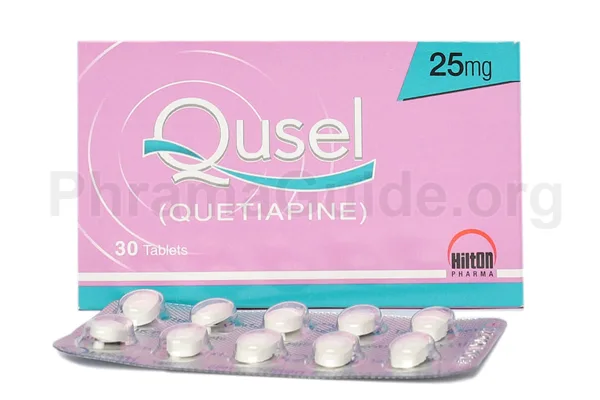Qusel tablet is used for the treatment of certain mental health conditions like Mania, Psychosis, and Schizophrenia. It belongs to a class of drugs known as atypical antipsychotics. Following are some common (approved) and off-label (clinically trialed) uses of Qusel tablets:
Common Uses of Qusel Tablet
- Schizophrenia: Qusel tablet is a drug of choice for the treatment of schizophrenia. It helps in managing symptoms such as hallucinations, delusions, disorganized thinking, and emotional withdrawal associated with this mental disorder.
- Bipolar Disorder: Qusel tablet is also used for the treatment of bipolar disorder, both for acute episodes of mania and for the long-term maintenance of the condition. It can help stabilize mood, reduce manic symptoms, and prevent episodes of depression or mania.
- Major Depressive Disorder: Qusel tablet is sometimes used as an adjunctive treatment (along with an antidepressant) for major depressive disorder when other treatments have been ineffective. It can help improve depressive symptoms and regulate sleep patterns.
Off-label Uses of Qusel Tablet
- Generalized Anxiety Disorder: Qusel tablets may be used off-label for the treatment of generalized anxiety disorder (GAD). It helps reduce anxiety symptoms, promote relaxation, and improve overall well-being.
- Insomnia: Qusel tablet can also be used for the management of insomnia, particularly when other sleep aids have not been effective. Its sedating properties can help induce sleep, but it should be used with caution due to potential side effects.
- Post-traumatic Stress Disorder (PTSD): Qusel tablets may be used to manage symptoms of PTSD, such as intrusive thoughts, nightmares, hyperarousal, and mood instability. It helps with sleep disturbances and overall symptom control.
- Obsessive-compulsive Disorder (OCD): In some cases, Qusel tablets may be used as an adjunctive treatment for OCD, particularly when other medications have not been effective. It may help reduce obsessive thoughts and compulsive behaviors.
- Autism Spectrum Disorders (ASD): Qusel tablets may be used to manage specific symptoms associated with ASD, such as irritability, aggression, and self-injurious behavior.

What is Qusel?
Qusel is one of the leading brands of Quetiapine, manufactured and marketed by Hilton Pharmaceuticals (Pvt) Ltd, Pakistan.
Qusel Alternatives : Other Similar Brands
The following are some alternative brands of Qusel and their manufacturers.
- Qutyl : Consolidated Chemical Laboratories (Pvt) Ltd, Pakistan.
- EvoKalm : Pharmevo (Pvt) Ltd, Pakistan.
- Q-Par : Helix Pharma (Pvt) Ltd, Pakistan.
- Seroquel : ICI Pakistan Ltd.
- Qutirate : Shaooq Pharmaceuticals, Pakistan.
- Ziapine : Mass Pharma (Pvt) Ltd, Pakistan.
- Pequit : Medizan Labs (Pvt) Ltd, Pakistan.
- Qutia : Glitz Pharma, Pakistan.
- Quepin : Platinum Pharmaceuticals (Pvt) Ltd, Pakistan.
- Nubaquel : Nabiqasim Pharma, Pakistan.
Qusel : Available Formulations and Strengths
Presently, Qusel is available in Tablets Form with the following strengths.
Qusel Tablets : 25mg, 100mg, 150mg, and 200mg strengths.
Who Should Not Use Qusel?
Qusel has certain contraindications, which are specific situations or conditions in which the use of Qusel is not recommended due to potential risks or lack of efficacy.
Hypersensitivity: Qusel should not be used in individuals who have a known hypersensitivity or allergic reaction to the medication or any of its components. Allergic reactions can range from mild skin rashes to severe and potentially life-threatening conditions.
Cardiovascular conditions: Qusel should be used with caution in individuals with pre-existing cardiovascular conditions, such as a history of heart attack, heart failure, arrhythmias, or significant cardiovascular disease. It may increase the risk of adverse cardiovascular events.
Dementia-related psychosis: Qusel is not recommended for the treatment of dementia-related psychosis, as it may increase the risk of stroke and mortality in elderly patients with dementia. The use of antipsychotic medications in this population should be carefully evaluated.
Prolonged QT interval: Qusel should be used cautiously in individuals with a history of QT interval prolongation or other risk factors for QT prolongation, such as certain cardiac conditions, electrolyte abnormalities, or the concurrent use of medications known to prolong the QT interval. It may further increase the risk of arrhythmias.
Breastfeeding: Qusel is excreted into breast milk, and its use during breastfeeding is not recommended. It is important to discuss the potential risks and benefits with a healthcare professional, who can help weigh the options and determine the best course of action.
What is the Recommended Daily Dosage of Qusel?
Qusel Dose for Schizophrenia:
- Initial Dose: One tablet of 25mg twice daily.
- Maintenance Dose: 2-3 tablets of 150mg per day, divided into two or three doses.
Qusel Dose for Bipolar Disorder (Acute Manic Episodes):
- Initial Dose: Two tablets of 25mg twice daily.
- Maintenance Dose: 2 – 4 Tablets of 200mg per day, divided into two doses.
Qusel Dose for Bipolar Disorder (Maintenance Treatment):
- Dose Range: The recommended dose range for long-term maintenance treatment is typically between 2 – 4 tablets of 200mg per day, administered once daily or divided into two doses.
Qusel Dose for Major Depressive Disorder (Adjunctive Treatment):
- Dose Range: 1 – 2 tablets of 150mg per day, taken in the evening.
How Qusel Works?
Qusel primarily acts as an antagonist (blocker) at various receptor sites in the brain, including dopamine D2, serotonin 5-HT2A, and adrenergic alpha-1 receptors.
- Dopamine modulation: Qusel acts as a dopamine D2 receptor antagonist, meaning it blocks the dopamine neurotransmitter from binding to these receptors. This blockade helps reduce the overactivity of dopamine transmission in certain brain regions, which is associated with psychotic symptoms in conditions like schizophrenia.
- Serotonin modulation: Qusel also acts as a serotonin 5-HT2A receptor antagonist. By blocking these receptors, it modulates the activity of serotonin, a neurotransmitter involved in mood regulation. This modulation may help alleviate symptoms of depression and stabilize mood in bipolar disorder.
- Adrenergic modulation: Qusel acts as an antagonist at adrenergic alpha-1 receptors, which are involved in the regulation of various physiological processes. This modulation may contribute to the sedative effects of Qusel, helping with sleep and reducing agitation or anxiety.

Leave A Comment